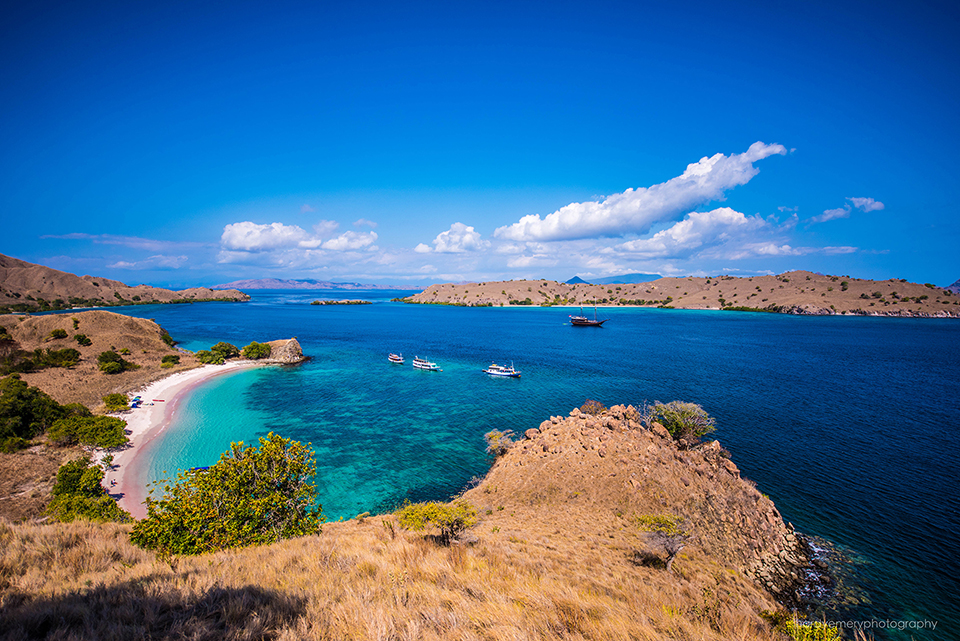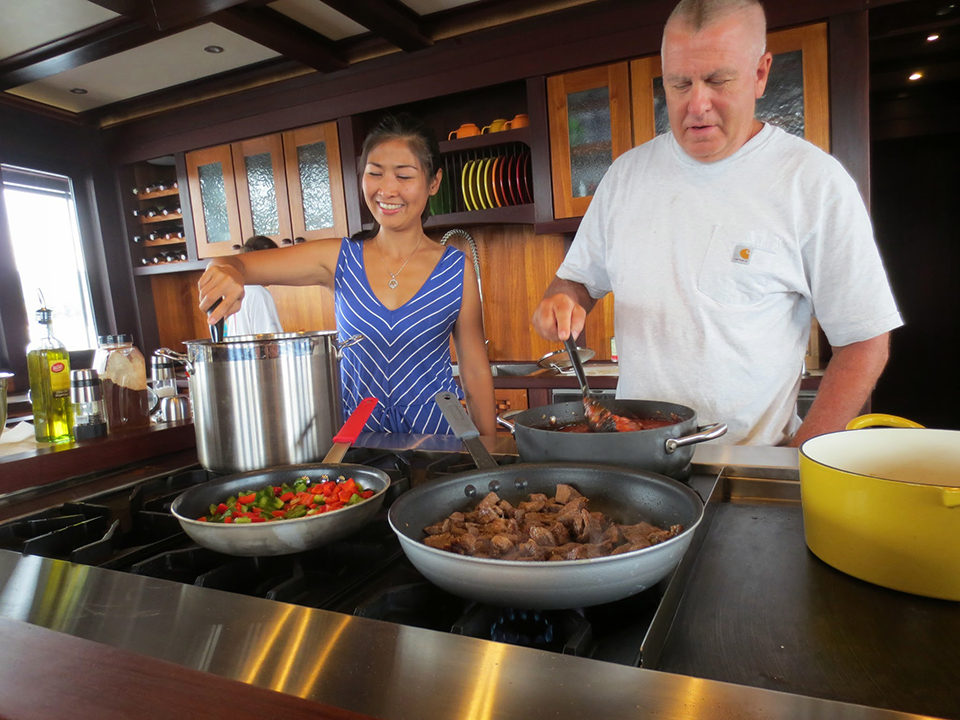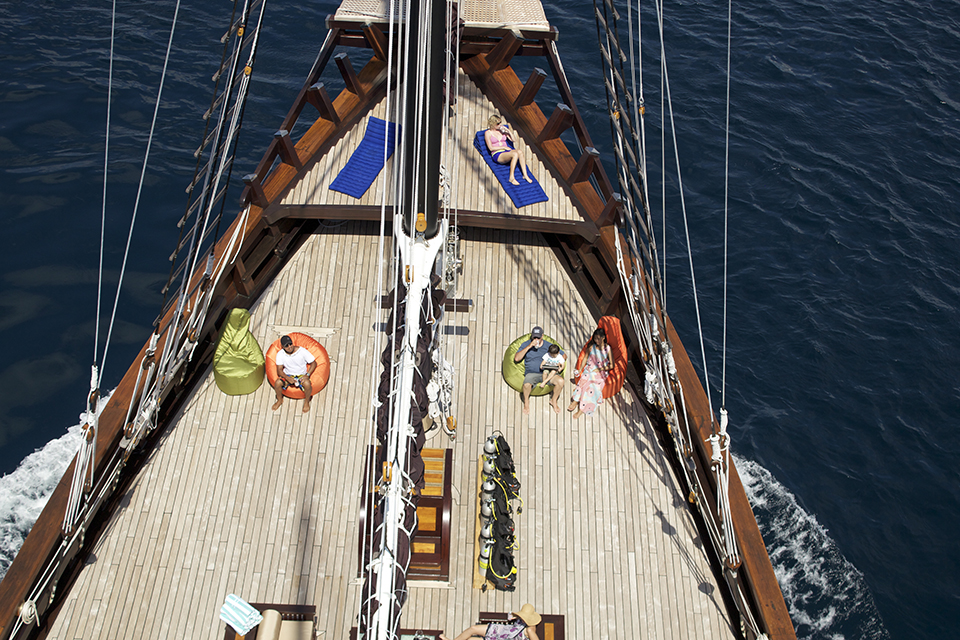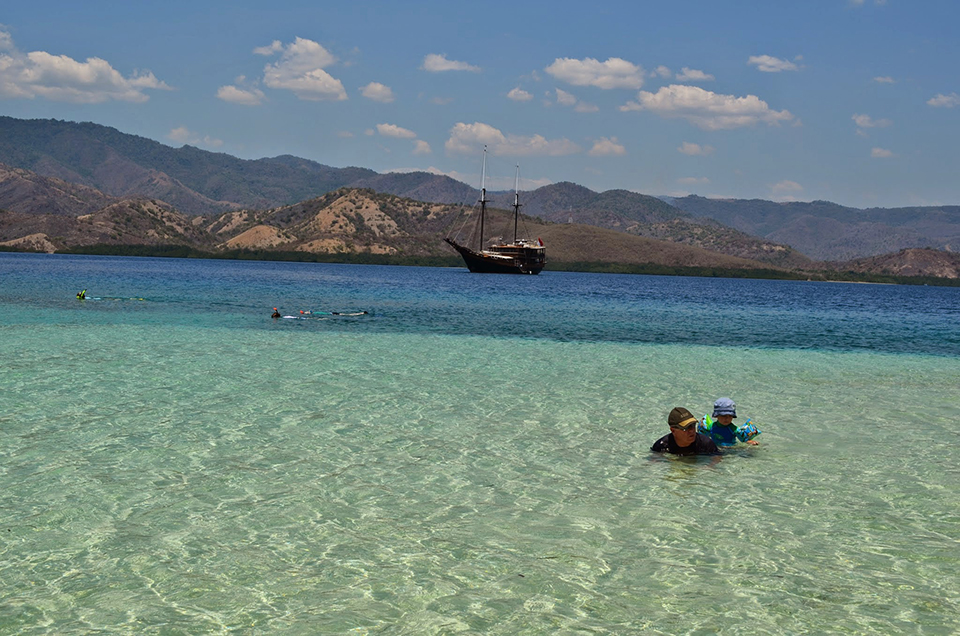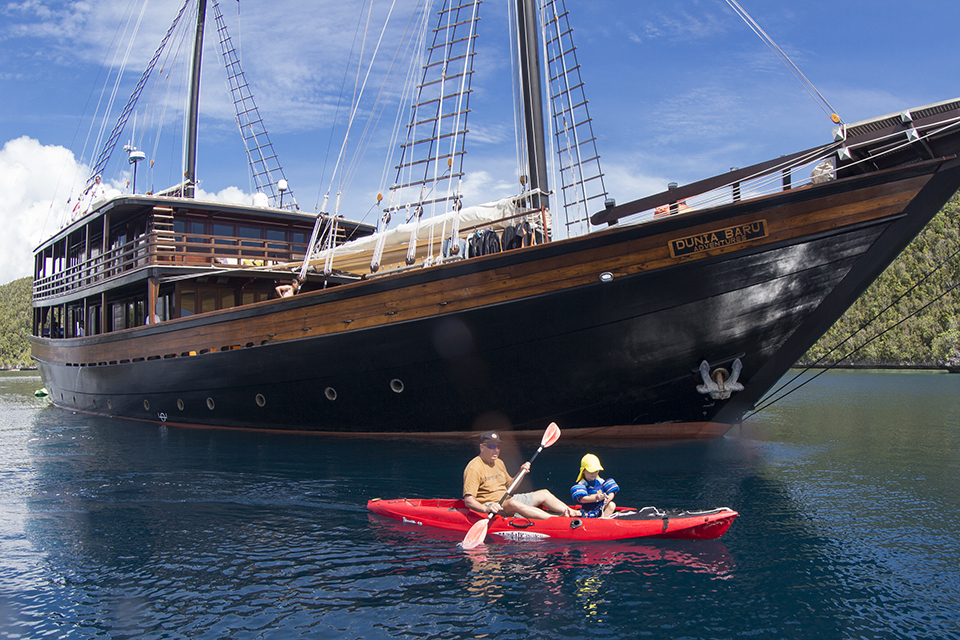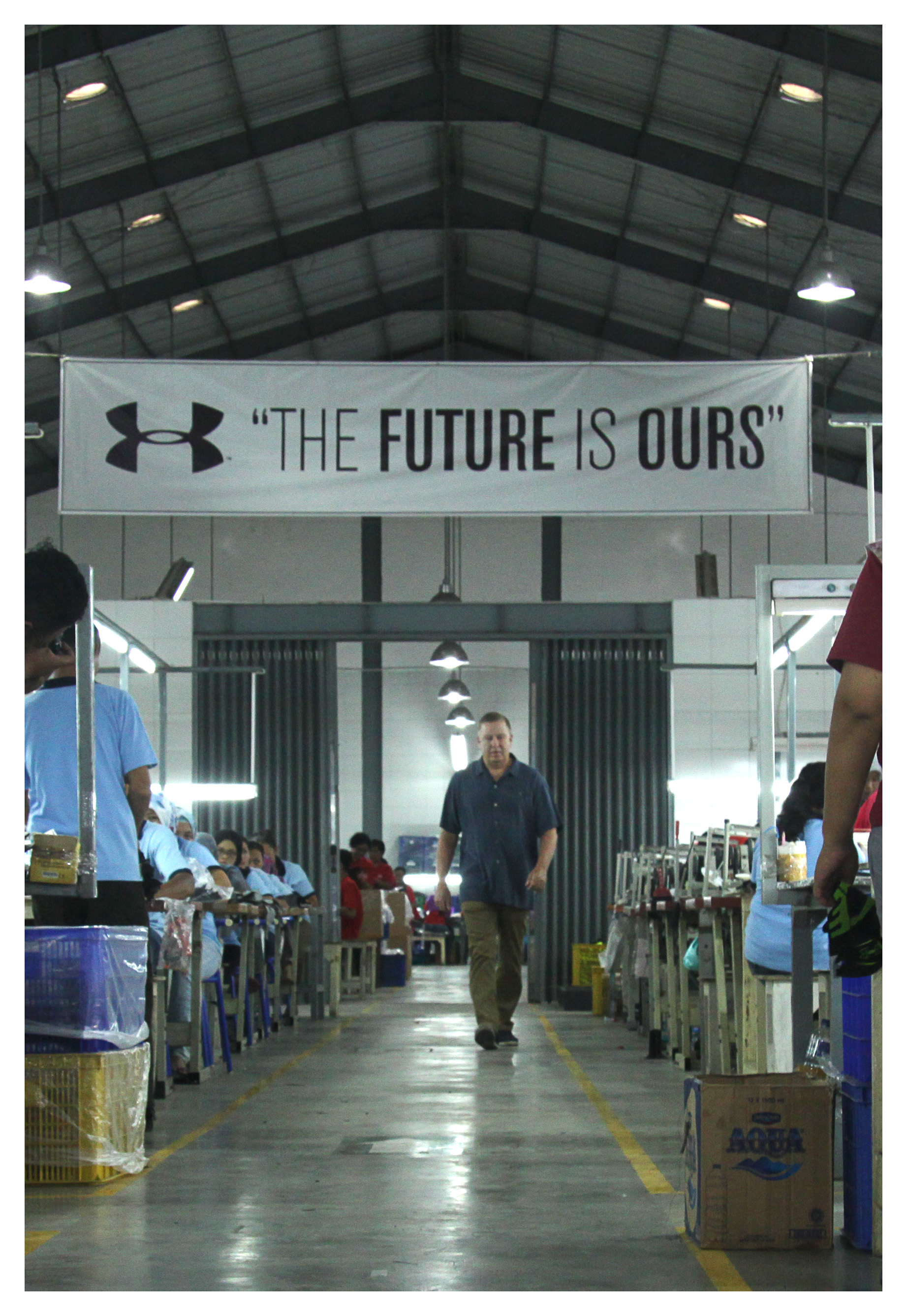Spirit of Adventure
Based in Indonesia, with a childhood affinity with the ocean, Mark Robba's ambition led him to build one of the world's most unusual yachts.
Written by Scott Alle
Photography by Mark Eveleigh, Kara Murphy Raja, Dennis Anderson
01 March 2017
Mark Robba is on the phone to me from his office in Yogyakarta, in central Java.
It’s handily perched on the first floor of one of the factories belonging to his company PT Glove Indonesia, the country’s biggest glove manufacturer.
As we chat I try to remember some factoid about the city, but nothing comes to mind except some hazy recollection about Java being the most crowded island on earth, which leads to a mental picture of a nondescript building wedged between crowded narrow laneways and tightly packed housing.
So when he sends me a photo of almost postcard views over terraced rice fields and banana palms I’m a little surprised. “Nothing is ever as you expect it to be,” he quips when I mention it.
I later realise it’s an axiom Mark Robba has absorbed during more than two decades in Indonesia, and especially during the epic build of one of the world’s most unusual superyachts.
Nearly 51 metres long, (167 feet), including a magnificent bowsprit, with a 11-metre, weighing 400 tonnes and constructed entirely from ironwood and teak, the Dunia Baru is a breathtaking realisation of the superlative skills of a group of master craftsmen.
“I guess from the beginning my focus is that she had to be the best build ever built in Indonesia, and I started off getting everyone to commit and agree that this was what the project was going to be,” Mark says.
But straight off the logistics were daunting.
Just getting to the build site on the forested banks of a river deep in Kalimantan was an endurance test.
“It was a 15-hour trip from Bali, ” he recounts. “A 2-and -a- half hour plane ride, ten-hour car ride, and 2-and-a-half hours up the river to where the vey good lumber was. We were going there every six weeks and every time I would go there I would bring them shirts, my wife and I would bring them food, we’d make food for them. So we developed a special bond from the beginning.”
The master carpenters from the village of Ara first assembled an ironwood crane to help lift the bow, and then they laid the keel in a pit on the riverbank. A wood planer, a couple of sanders and a single chainsaw were the only power tools they used.
Ironwood flexes like metal with heat and is worked over in large firepit. The shipwrights can shape two pieces of wood a day, and most boats take about two years to complete. Dunia Baru, though, took much longer, including finishing in Bali, where the hull was towed by tugboat. Mark wanted to set a new level of luxury. The steering wheel alone required four days of bending ironwood pieces and then joining them by hand in a mould.
“The project was eight years,” he says. “A lot of the guys were younger guys and when we finished the boat we had 40 people that were working on the boat. It was my desire to keep all 40 people but of course that was impossible and strangely enough many of the shipwrights have a fear of water, and of being on boats. We ended-up taking about 8 of the original people from when we first started,”
The Dunia Baru and her initially hesitant crew first began cruising to some of Indonesia’s 17,000 islands in 2014, but Mark’s affinity with the ocean and sailing was fused long before on the Atlantic waters which buffet one of America’s most famous peninsulas.
“Every summer we would spend a month on Cape Cod in Massachusetts,” he remembers. “We had a sunfish (sailboat) and when I was 13 I got a Boston Whaler that is when I really started to love to be on the water. ” He was underway on his course, and the rites of passage included “sleeping out on Stage Island off Cape Porpoise on the weekends in the summer. We were all around 13 and we would spend Saturday night drinking beer and eating lobsters – it was heaven”.
Mark’s father’s job as a consultant meant the family moved a lot, and after high school he started a degree in mechanical engineering at Clemson University in South Carolina, and quickly secured a place on the sailing team. Wrangling dinghies on a wind chilled 25 below zero Lake Michigan would have it an easy decision to sign-on for a summer job as crew on a classic 52 foot Sparkman & Stephens yawl being delivered from the Bahamas to New York.
After a bruising passage the owner sacked the two French crew and offered Mark the job of skipper of Baccarat.
“She was a famous Bermuda racer, gorgeous with a flush deck,” he says with affection. “I was in and out of a lot of boatyards and this helped me understand what a proper yacht was.”
But after a couple of years accumulating solid on-water time and marine management experience, he opted to go back to college and finished with a Bachelors of Science in Industrial Management. “So I had to go back to school but always in the back of my mind that I would be a yacht owner someday myself,” he recalls.
“She was a famous Bermuda racer, gorgeous with a flush deck,” he says with affection. “I was in and out of a lot of boatyards and this helped me understand what a proper yacht was.”
However that wouldn’t happen for a while as worked his way through a variety of roles, including production quality assurance manager while also picking-up an MBA. Eventually he was appointed as operations manager for golf gloves for one of the world’s leading golf apparel and equipment companies.
During that time he’d often travelled to Asia to approve new factories, and when the company decided to cut production at its Korean operations, Mark saw an opportunity to replace the lost orders.
We had started sourcing product in Indonesia and that’s how I began my own business in Indonesia in 1992,” he says. “I had an acquaintance who was friends with the president of the Wilson brand, and he pulled that client in for me. In our first year we had a $10 million turnover.”
Now there are 4,300 employees at four factories which churn out just about every type of glove, from fitness, to stylish casual dress to specialist military and police hand protection. Turnover has tripled to $30 million per year.
He expresses a desire “to still be on the factory floor at 80”, though at 57 he would seem to have a while to bed down the succession plan. Mark’s son Christopher is very much part of the business, while his daughter Courtney is operations manger of the Dunia Baru.
“My hope is to spend three months a year on the boat, there’s all of Indonesia to see,” he enthuses. “We just finished a trip from Bali to Langkawi, Phuket up into Myanmar. The islands off Koh Phi Phi, the big cliffs they’re as beautiful as anywhere in the world. We’re about to do a trip from Malmurai half way down the northern coast of Flores, we’re going to go east to Alor and the Forgotten Islands. Indonesia has a surfeit of beautiful places.”
Guests also have the opportunity to sample the unique cruising experiences aboard this Phinisi style yacht, which is a melding of Indonesian boat building craft and western technology. Accommodation is seven staterooms, the master cabin has a king-sized bed has a private bridge deck with double sun or daybed and sofa and windows all around.
The crew of 18 includes a dive instructor, a Western chef, an Indonesian Chef and a western systems engineer. There’s a full complement of toys such as a 6.8 metre RIB, jet-skis, kayaks, paddle boards, full sets of dive-gear, and of course a Sunfish sailing dinghy.
As the boat is often sailing in remote pristine waters, there’s a serious effort to minimize her environmental wake.
Four cycle outboards are used in order to reduce emissions. There’s a very rigid protocol on trash recycling. All cans and bottles are recycled, while paper and plastics for food waste are separated for future disposal. There are large capacity gray and black water tanks for discharge in only permissible areas.
There’s also a spirit of discovery and exploration you can’t help being swept along by.
“What I’ve always told my kids and what I’ve always tried to live by is you should never go on a vacation,” Mark says. “What you should always do is have an adventure. In a true adventure you’ll have all the emotions, sometimes you will be frustrated, sometimes you are going to be upset, but mostly it will be wonderful.”
So perhaps the only thing you can expect is to have your assumptions and preconceptions erased and replaced by a rich collection of experiences.
Leading lady steps down


